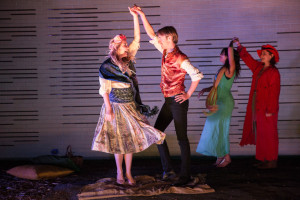
Thousands of years ago, our common ancestors began telling stories by casting shadows against the walls of caves. By the light of fire, humans developed the skill of storytelling to closer accompany their hungry imaginations. The shadows were eventually embodied by the figures they represented, which led to the creation of theater. This year’s chosen venue for the Stanford Shakespeare Company’s spring show of “The Winter’s Tale” transports the audience back to this deeply ancestral form of entertainment.
Performed May 22 – 25 at 8 p.m. and located outdoors at Josef Alber’s “Stanford Wall,” the play is a mesmerizing experience that manages to blur the boundary between play and virtual dream world. The production begins at a twilight hour that is just dim enough for the stringed lights hung above the audience’s seats to glow warmly. Approaching the venue, after passing under Littlefield’s Romanesque arched passageway, one can see the tops of two small tents hidden behind the trees of an enclosed field— like stumbling upon a troupe of traveling performers in the woods.
Adjacent to these tents stands the Stanford Wall. It is 50 feet in length, made of brick and striped by several metal bars. During the performance of “The Winter’s Tale,” it serves as the backdrop and stage, lit up from afar and connected on ground level with the audience. The smell of hay and blossoming trees perfume the air while faint acoustic folk music strums into the night. Remarkably, Insiya Jafferjee ’14 and Yura Kim ’17, the play’s technical director and set designer, respectively, have likened the theater space to the coziness of a farm.
Shakespeare’s strange tragicomedy shows the story of King Leontes (Matthew Libby ’17) whose unwarranted jealousy over his pregnant wife, Hermione (Hanna Tyson ’17), drives him to stubborn madness and tragically leads to her death, as well as their son’s (Lora Kelley ’17). Falsely believing that he has been made a cuckold, despite the pleading remarks by Paulina (Sunny Huang ’14) that cry otherwise, Leontes banishes his newborn “bastard” daughter to the wilderness where a bumbling old shepherd (Kevin Hurlbutt ’17) discovers her.
As the first half of the play careens towards tragic conclusions, the skies around the Stanford Wall gradually darken, sucking the audience into the world that Shakespeare has imagined and Nora Tjossem ’15, the play’s director, has created. An indoor theater performance would dim the lights before the performance to command the audience’s attention. Tjossem’s rendition of “The Winter’s Tale” uses the naturally fading sunlight for the same effect. An hour into the play, as the darkness of night shrouds the lit up stage and limits one’s vision to it, the world of the play is indefinitely expanded into its dark surroundings. The feeling is analogous to lying down to rest and unexpectedly finding oneself asleep and dreaming.
Watching the actors’ shadows splayed across the brick wall is so primitively familiar and the story so transporting that the roaring of airplanes that sometimes pass overhead is shockingly out of place.
The latter half of the play oddly twists the circumstances into a happy comedy with many ridiculous characters tromping across the stage. The hard-of-hearing shepherd and his jester-like son (Kaya McRuer ’17) are a hilarious duo who are repeatedly conned out of their gold by the fast-talking and slimy Autolycus (also Kelley).
There is a fantastic “sheep shearing” festival scene where the two have unwittingly invited their king Polixenes (Graham Roth B.S. ’10 M.S. ’14) and his close friend Camillo (Jackie Emerson ’17) who are both disguised as bent old men. It is an occasion of celebration where Polixenes’ son Florizel (Patrick O’Hare ’17) announces his desire to wed with the Shepherd’s daughter Perdita (Melanie Arnold ’16), who is unknowingly the banished daughter of Hermione. The actors pair off and square dance to a fiddling tune. Try not to stand up and clap along to their celebratory enjoyment.
When you go to see this reimagining of Shakespeare’s late romance, make sure to bring warm blankets and good friends, as the performance goes into the cool night. The warmth of the play and the bundling up against close friends keep the chilliness of the brisk carnival air at bay. And do not be surprised if you find yourself suddenly shipped away to sea in a world of jealous kings and howling fools, or vice versa.
Contact Tulio Ospina at tospina “at” stanford.edu.
